"If I Ruled the World" is a popular song, composed by Leslie Bricusse and Cyril Ornadel, which was originally from the 1963 West End musical Pickwick.
"The Wonder of You" is a song written by Baker Knight. It was originally recorded by Vince Edwards in 1958, but this recording has never been released. In an interview with a DJ from Chattanooga, Tennessee, Ray Peterson told the story of how Baker Knight confided that "The Wonder of You" was originally written as a gospel song.

"Baby I Need Your Loving" is a 1964 hit single recorded by the Four Tops for the Motown label. Written and produced by Motown's main production team Holland–Dozier–Holland, the song was the group's first Motown single and their first pop Top 20 hit, making it to number 11 on the US Billboard Hot 100 and number four in Canada in the fall of 1964. It was also their first million-selling hit single.
"Ebb Tide" is a popular song written in 1953 by the lyricist Carl Sigman and composer and harpist Robert Maxwell. The first version was sung by Vic Damone backed by Richard Hayman's orchestra. The highest-selling version was released by the Righteous Brothers in 1965.

"The Morning After" is a song written by Al Kasha and Joel Hirschhorn for the 1972 film The Poseidon Adventure, winning Best Original Song at the 45th Academy Awards. Following this success, Maureen McGovern recorded a single version that became a No. 1 hit in the US for two weeks during August 1973, with Gold record sales. Billboard ranked it as the No. 28 song for 1973.
"I Believe" is a popular song written by Ervin Drake, Irvin Abraham, Jack Mendelsohn and Al Stillman in 1953. The most popular version was recorded by Italian-American singer Frankie Laine, and spent eighteen weeks at No. 1 on the UK Singles Chart.
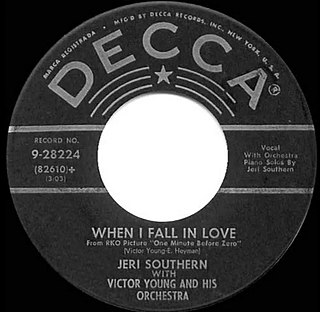
"When I Fall in Love" is a popular song, written by Victor Young (music) and Edward Heyman (lyrics). It was introduced in Howard Hughes' last film One Minute to Zero as the instrumental titled "Theme from One Minute to Zero". Jeri Southern sang on the first vocal recording released in April 1952 with the song's composer, Victor Young, handling the arranging and conducting duties. The song has become a standard, with many artists recording it; the first hit version was sung by Doris Day released in July 1952.

"Abraham, Martin and John" is a 1968 song written by Dick Holler. It was first recorded by Dion, in a version that was a substantial North American chart hit in 1968–1969. Near-simultaneous cover versions by Smokey Robinson and the Miracles and Moms Mabley also charted in the U.S. in 1969, and a version that same year by Marvin Gaye became the hit version in the UK. It was also a hit as part of a medley for Tom Clay in 1971, and has subsequently been recorded by many other artists. Holler was particularly impressed that Bob Dylan covered the song.

"Three Times a Lady" is a 1978 song by American soul group Commodores for their album Natural High, written by lead singer Lionel Richie. It was produced by James Anthony Carmichael and Commodores.

"Who's Sorry Now?" is a popular song with music written by Ted Snyder and lyrics by Bert Kalmar and Harry Ruby. It was published in 1923 as a waltz. Isham Jones had a hit recording in 1923 with the song arranged as a foxtrot. Later sheet music arrangements, such as the 1946 publication that was a tie-in to the film A Night in Casablanca, were published in 2
2 time. Other popular versions in 1923 were by Marion Harris, Original Memphis Five, Lewis James, and Irving Kaufman.
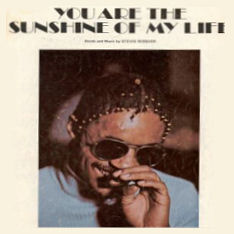
"You Are the Sunshine of My Life" is a 1973 single released by Stevie Wonder. The song became Wonder's third number-one single on the Billboard Hot 100 chart and his first number-one on the Easy Listening chart. It won Wonder a Grammy Award for Best Male Pop Vocal Performance, and was nominated for both Record of the Year and Song of the Year. This song was the second single released from the 1972 album entitled Talking Book, which stayed at number one on the R&B albums chart for three weeks.
"If I Didn't Care" is a song written by Jack Lawrence that was sung and recorded by the Ink Spots featuring Bill Kenny in 1939.
"What About Me?" is a 1984 song written by Kenny Rogers, producer David Foster, and singer-songwriter Richard Marx. It was recorded by Rogers, Kim Carnes, and James Ingram as a trio song from Rogers' Platinum certified 1984 album of the same name.

"Gimme Dat Ding" is a 1970 popular UK song, of the novelty type, sung by "one-hit wonder" The Pipkins, and written and composed by Albert Hammond and Mike Hazlewood. Released as a single, it is the title selection of an album which The Pipkins recorded and released on the EMI Columbia Records label. It also appeared on a compilation album of the same name, which The Pipkins shared with another up-and-coming UK group, The Sweet. It has also been included on many other compilation albums. "Gimme Dat Ding" was arranged by Big Jim Sullivan.

The Andy Williams Show is the twenty-sixth studio album by American pop singer Andy Williams that was released in the fall of 1970 by Columbia Records. In his review on AllMusic.com, William Ruhlmann writes that "The Andy Williams Show LP was not a soundtrack recording from the TV series, and it was not really a live album, although it gets categorized as such. What appears to be the case is that Columbia Records took a group of Williams' studio recordings, most of them made during the summer of 1970 and consisting of his versions of recent soft rock hits, and added a lot of canned applause along with some of the kind of musical interludes used to usher numbers on and off on the show, including bits of its "Moon River" theme music at the start and the finish."

Love Story is the twenty-seventh studio album by American pop singer Andy Williams that was released on February 3, 1971, by Columbia Records. This was another in his series of cover albums, but the title track, subtitled "Where Do I Begin", was the one song included that he originated.
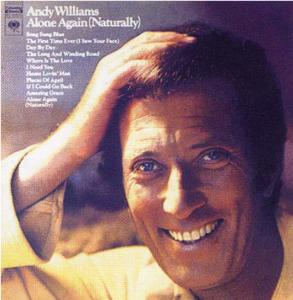
Alone Again (Naturally) is the thirtieth studio album by American pop singer Andy Williams, released in September 1972 by Columbia Records and mainly consisting of songs originated by other artists. For its release in the UK, the album was titled The First Time Ever (I Saw Your Face), and three of the songs were replaced with the 7-inch single tracks "Who Was It?" and "Marmalade, Molasses & Honey" and a recording that was not released on vinyl in the U.S., "If You're Gonna Break Another Heart".
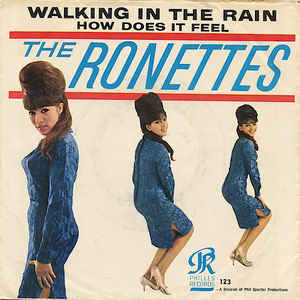
"Walking in the Rain" is a song written by Barry Mann, Phil Spector, and Cynthia Weil. It was originally recorded by the girl group the Ronettes in 1964 who had a charting hit with their version. Jay and the Americans released a charting hit cover of the song in 1969. The song has since been recorded by many other artists over the years, including the Walker Brothers.

Song Sung Blue is an album by American pop singer Johnny Mathis that was released on September 13, 1972, by Columbia Records and featured his renditions of mostly recent chart hits.
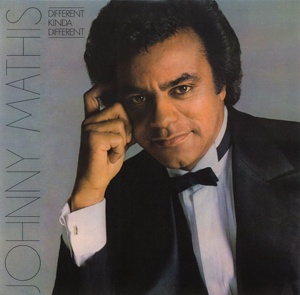
Different Kinda Different is an album by American pop singer Johnny Mathis, released on June 16, 1980, by Columbia Records. It included covers of two standards and two recent hits. It also continued the trend of recording duets with a female singer; for this project Paulette McWilliams shared vocal duties on two of the six new songs.













